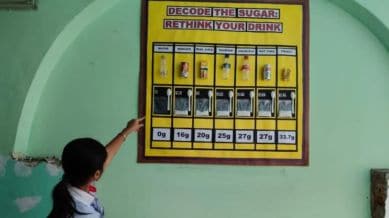Stay updated with the latest - Click here to follow us on Instagram
Delhi schools told to impart education on processed foods to students
The school heads have been asked to submit an action taken report of all such activities conducted with the school health branch by September 20

The Delhi Education Department has asked all schools in the Capital to impart education on processed foods to students, as per a recent circular.
Making students aware about the evils of consuming unhealthy and unbalanced diet, on the lines of an initiative by the CBSE, and educating students about food processing including its scientific principles, innovations, health implications, and, quality standards to help them make informed dietary choices and understand the entire value chain from farm to fork — these are some of the measures that need to be followed, according to the circular sent to the school heads.
monthly limit of free stories.
with an Express account.
The school heads have been asked to submit an action taken report of all such activities conducted with the school health branch by September 20.
The circular comes following directions from the Department of School Education and Literacy last month to education secretaries of all states and Union territories “to develop effective strategies to promote healthy eating habits and reduce the burden of diet-related health problems.”
It also mentioned recent initiatives by the CBSE to install oil and sugar boards to create awareness on consumption of sugar and high-fat foods.
“This awareness will not only counteract prevailing myths but also spark interest in careers in food technology, food engineering, and nutrition, thereby contributing to’ national goals of food and nutritional security and self reliance,” it stated.
The Centre has recommended a bagless day and field visits to expose students and make them aware of the adulteration in food chain via pesticides, fertilizers and also in the processed food being sold in the market.
Dr Subrata Gupta, Secretary, Ministry of Food Processing Industries (MoFPI) wrote in an official communication to DoSE, “…food processing remains an important yet often misunderstood subject in today’s society. Given the growing prevalence of misinformation and misconceptions surrounding processed foods, it is imperative that our education system takes proactive steps to equip students with accurate, science-based knowledge on this topic.”
Gupta requested the department to consider incorporating fundamental food science and processing topics in school curricula, complemented by extracurricular initiatives such as awareness campaigns, food fairs, expert collaborations and food safety workshops.
He noted that processed food is mostly associated with “negative perception” due to the presence of additives, excess sugar, fat or preservatives in some commercial products.
“However, such a general perception overlooks the critical role that food processing plays in enhancing food safety, extending shelf life, improving nutritional value and taste, and reducing food wastage —all of which are especially vital in a country like ours, where post-harvest losses are high and access to affordable nutrition remains a challenge. Yet, the increasing prevalence of NCDs and their perceived correlation with Ultra Processed Food (UPF) and High Fat, Sugar, Salt (HFSS) foods is a matter of concern,” Gupta underlined.